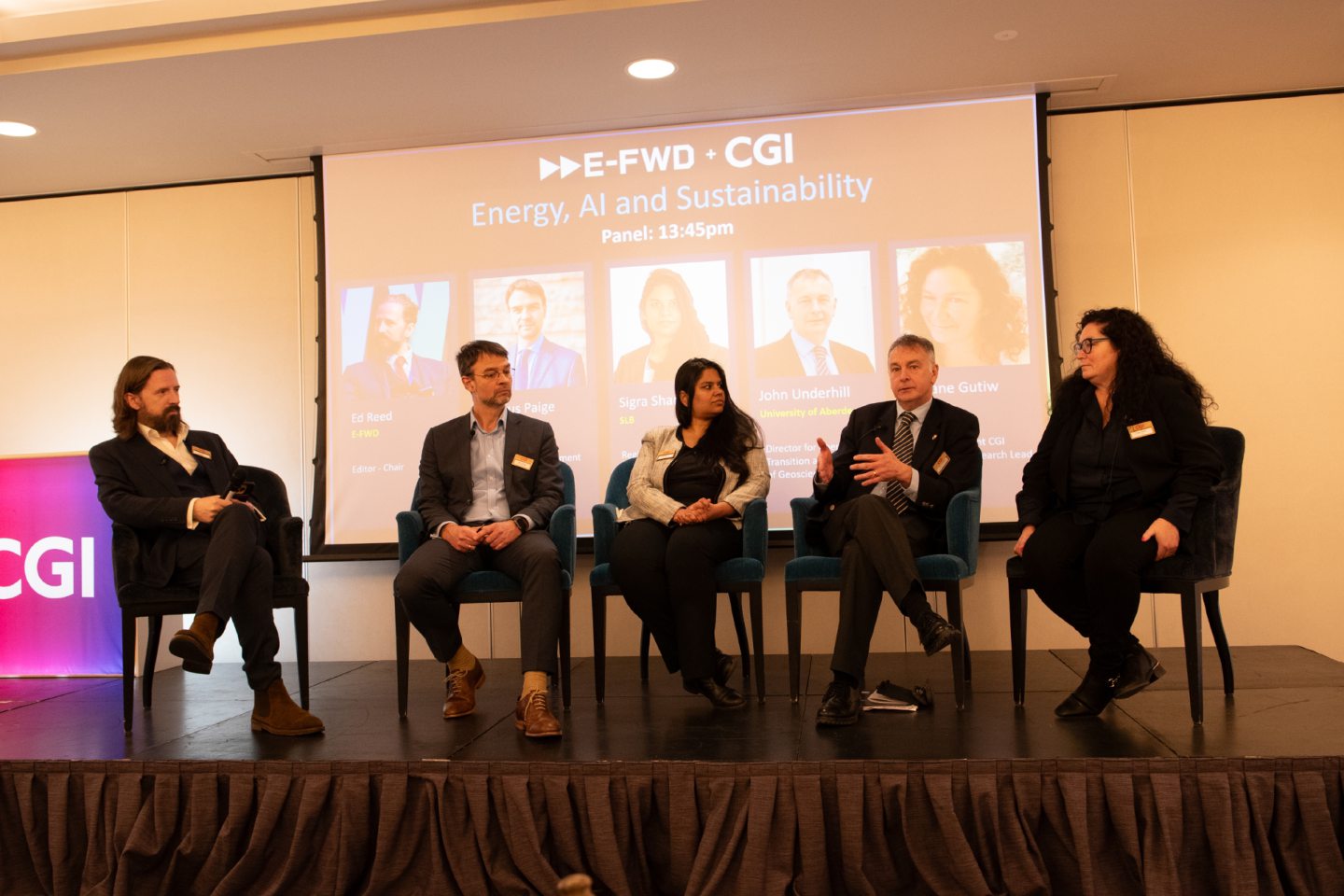Combining the potential of AI and the energy sector could accelerate the UK’s economic future. But policy hurdles pose challenges, experts at a recent CGI event concluded.
“The energy sector is one of the first that’s invested in edge technology, IoT devices, and as a result energy firms are housing an incredible wealth of relevant data,” CGI VP of global AI research Dr. Diane Gutiw said.
“Now you have the ability – with tools like generative AI and agentic AI – to interrogate that data, previously too immense to analyse efficiently, and get value out of that investment that has been collected for years.” These uses build on traditional AI/ML concepts such as predictive maintenance and machine learning, with which the industry has already come to terms.
Marcus Paige, corporate development officer at Kellas Midstream Partners, agreed. “We’re already on that [data and AI] journey and we have been on it for a long time. AI is just another milestone on the road.”
But while the technological foundations are solid, there is a more fundamental challenge. The UK’s energy policy framework is struggling to keep pace with innovation.
The energy industry is rich with datasets and information that have undergone various analyses over the years. AI offers a way to bring different sources together and quiz them using natural language.
Diving into data
That is not to say it is all plain sailing. “It’s important that there’s a solid foundation to build upon. Having robust, good quality data that is integrated” is essential to build reliable models, while also requiring good governance in management, SLB’s regional head of sustainability Europe Sigra Sharma said.
“It’s not just about having a fancy AI model. It’s about having the right one,” she said.
Using AI can help identify data shortfalls. Professor John Underhill, from Aberdeen University’s Centre for Energy Transition, highlighted potential shortcomings in well abandonment data.
“Thousands of wells have been drilled in the North Sea,” he said. “Many of those were plugged and abandoned, in line with the then regulations, but without necessarily thinking about the subsurface and that those wells may be needed again, 40 years later, for carbon storage.”
Using AI can help interrogate the well database and “put up red flags where we need to know more.”
Well integrity is crucial, given how CO2 interacts with water to create carbonic acid.
“We need to know that the steel is right, the cement is right, the plug and abandonment of the boreholes is correct and compliant for CO2. Otherwise, we just put it in – and it will come out again. And we will have failed.”
Just as the needs of the energy industry are evolving, so too is AI.
Finding value
CGI’s Gutiw noted a number of ways in which AI was changing. One instance is the area of digital triplets, where AI can be layered on top of the well-established digital twin concept. Adding agentic AI to these functions “makes the tools smarter and serve a purpose, by having context-based trained models that are able to autonomously do things that solve harder problems – including adding an agent to improve the quality of AI outputs which are a driver to increase use and adoption for business decision-makers”.
The way in which people are able to quiz data more easily, via generative AI, should not be ignored. “The ability to use natural language to have a conversation with your data is what’s coming next. There’s also a shift from these very large language models to small language models, or context-specific models. Those are not trained on what’s the best pizza in London, but are trained on specific energy sector standards, data and context.”
Real world
Sharma said there was a clear use case in optimising processes, for instance. “That’s already ongoing. It’s not just about the asset and production, but even on the back end when you look at your supply chain resilience.”
The SLB executive said it was a question of optimising workflow. “The one challenge I do see is upskilling your workforce. It’s very important to have domain experts come up to a level where they can start using AI and we start getting more value.”
Underhill noted there had been a degree of scepticism from industry initially on AI. “But as you build the data, you then get the confidence of whether that particular technique is robust or not. So you refine it and continue to do so and test it.”
The industry has now passed the “tipping point”, he said. “The amount of data sets in the energy sector that demand interrogation – the only way to keep up, catch up and maybe overtake, is to deploy AI techniques.”
System challenge
AI has a way to go to win over the broader public, not least in its energy demand, while people within the industry are coming to accept the technology. Finding efficiencies is one way that AI can help reduce emissions and drive decarbonisation. But at the same time, expanding AI use will drive up power demand.
There is much debate about how much power AI data centres will need. A single use of the ChatGPT chatbot consumes 10 times as much energy as a Google search or more.
The National Energy System Operator (NESO) has forecast AI data centre energy demand will increase fourfold by 2030. Kellas’ Paige noted the appeal of Scotland to build these new data centres.
“We have enough renewable energy in this country today. We just don’t have a good grid, and we don’t have enough storage. And I think that’s always going to be the case,” he said.
Out of mind
Paige cited the UK’s anti-oil and gas plans as adding a further challenge to the power system’s problems. The country is “massively curtailing the future of our offshore oil and gas, which provides the flexible energy that facilitates the use of wind and solar, and will power these tools that will create efficiency. So at the moment, the policy is just, forgive me, nonsense.”
Underhill agreed with Paige’s criticism about a lack of foresight in policy planning. The energy sector has relied on a strategy of “out of sight, out of mind”, he said.
“But we still need cabling to come into the beach. We need new electricity substations and new connections with pylons. AI can play a part in all those demand scenarios, around planning and mapping – but there’s also a bigger question around how to do it in a way that is not going to impose fuel poverty or hardship and gives us the transition to net zero.”
Sharma called for consideration to go into planning of new data capacity. “We need to be mindful of how we are setting them up, right? Do they have a renewable park nearby, for instance? Are there ways to use waste heat for local needs?”
The new normal
Just as we have incorporated staples of science fiction in our lives – from mobile phones to robots, to bionic limbs and the internet – so too will AI fade into the background, predicted Gutiw. “We’re going to forget that it’s AI,” she said. “These solutions, as they get smarter and more reliable, will become an assistant on our desktop – no different than spell check.”
There is a vision of a collaborative future, where AI helps people do their jobs easier and faster, solving complex challenges and cutting emissions.
But the local challenges of the UK show the pitfalls ahead. Success will depend on technology continuing to improve, but also policy and infrastructure supports.
AI and energy plans go hand in hand. If one succeeds, it will underpin the other. But the opposite is also true. Should AI be unable to deliver on its promise, emissions will rise and efficiencies be lost. While if energy expansion falters, data centres risk being left high and dry.
Paul de Leeuw: From artificial intelligence to energy intelligence


 © Supplied by Submitted
© Supplied by Submitted © Supplied by Submitted
© Supplied by Submitted






